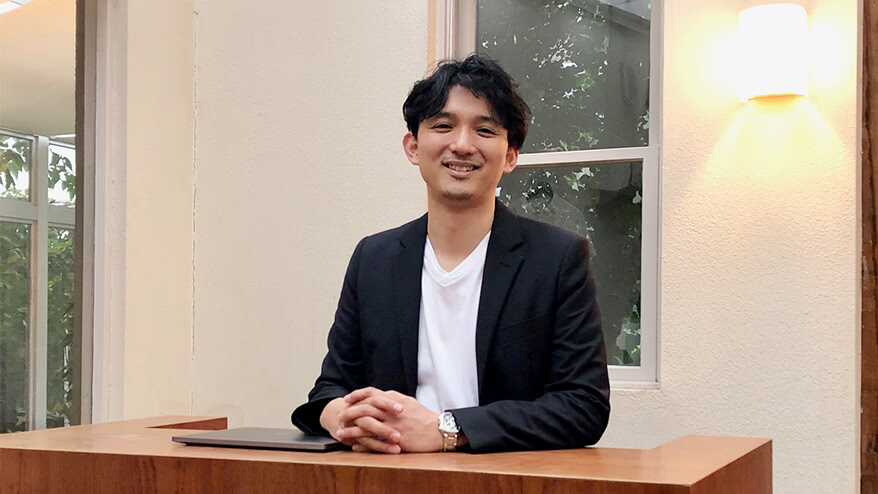Hello. I'm Sugimoto, a Kyoto-based writer who helps out behind the scenes at the Monosasu website.
I will now be taking over the baton of " Freedom and Responsibility: Everyone's Systems and Work Styles Laboratory ," a series previously written by Kimi-chan, or Nakajima Nozomi , and beginning interviews with our employees.
Monosus introduced Full Flex in January 2017.
We were able to decide for ourselves when to work, and through trial and error, we each created our own work rhythm. Then, this year, with the spread of COVID-19, full remote work was introduced, and each person also had to decide for themselves where to work.
Now that we have freedom in when and where we work, how are people creating autonomous work styles? And as people spend more time working as individuals, how is attitude toward the "company" or organization changing? This time, we spoke with Yasuo Sakamoto, who works in sales in the marketing department.
If you can harness the power of habit,
It's better to have fixed working hours
Sugimoto: What changes have there been in working styles since full flextime was introduced four years ago?
Sakamoto: We discussed it as a team at the time and decided that the basic hours were fixed from 10am to 7pm. We thought it was a waste of energy to think, "What time should I go to work today?" and that it would be better to use the power of habit well. Actually, I think it's very hard to turn on the "Okay, let's work" switch. I think it's less stressful to be tied down to a certain extent.
Also, in the case of sales jobs, there wasn't really much of a concept of working hours to begin with. Before deadlines and competitions, you have to do whatever you can, but on the other hand, there are days when your schedule suddenly opens up. It's just a matter of whether you sneak out or leave work with a big smile, saying "I have full flex time," so my behavior probably didn't change much.
Sugimoto: If you work in sales, have you ever thought about the idea that it's better to work during the times your clients are active?
Sakamoto: That's right. I feel like there are more opportunities if you work according to the hours that customers are working. On the other hand, I think that the production staff may have felt that they could concentrate better working in the middle of the night when the phones aren't ringing.
Remote work had a much bigger impact than flextime
Sugimoto: And since the spread of COVID-19, Monosus has implemented fully remote work.
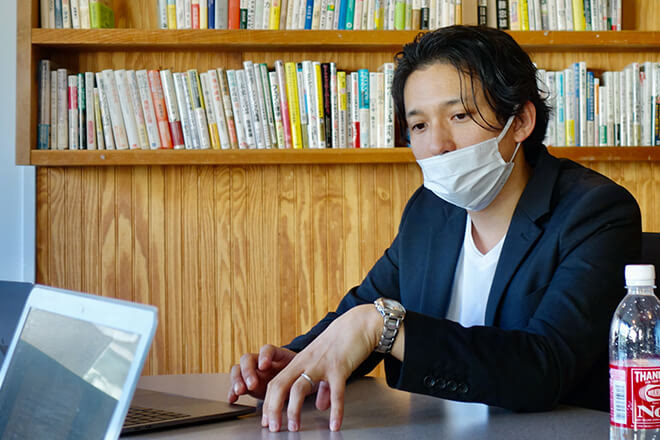
Sakamoto: I think that going fully remote had a much bigger impact than going fully flexibly. I have a lot more time because I don't have to travel, and I can now take breaks like having lunch with my family, which I never thought I would do before.
Sugimoto: Where do you mainly work now, Mr. Sakamoto?
Sakamoto: My home study. It was really helpful to have a space where I could work without being bothered by surrounding noise. Since I have a lot of online meetings, I installed a paid noise canceling app and spent a little money to improve my home environment.
Sugimoto: Even if you're working remotely, do you start work at 10am?
Sakamoto: I don't have to get ready to go out in the morning, so I start work early. I usually start work around 8-9am, and eat dinner with my family around 7pm. Before, I had to switch back on when I got home from work, but having a workspace at home makes it easier to switch back on. That may be an advantage.
Sugimoto: Do you find it difficult not being able to separate your work and personal life?
Sakamoto: I think it probably depends on the person. Some people are on at the office and off at home. But if you work in sales, you have the freedom to go straight home from a client's place, but you still have work to do when you get home, and clients call you if something happens. Those conflicts and adjustments are over at an earlier stage, so there's not much stress in working from home.
You can't hit a home run with a serious batting style
Sugimoto: Monosas wasn't the only one to go remote this year. I think the change caused by much of the world switching to remote work at once was also huge.
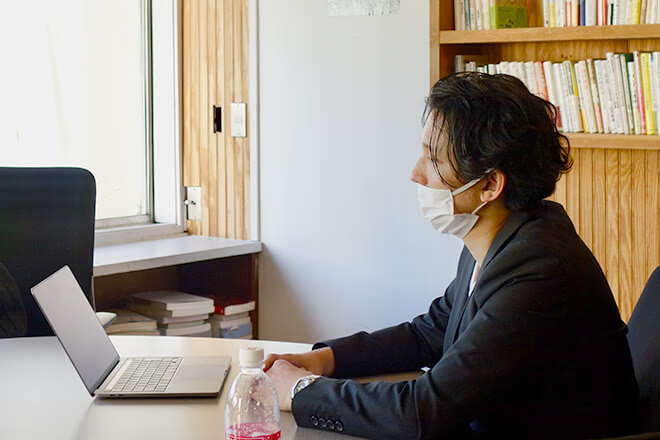
Sakamoto: It was good that the consultation area expanded nationwide, and some projects were decided through online competitions, so I felt like, "Maybe we can do work that we've never done before?" At that time, we rehearsed as a team beforehand and presented, which was fun and helped us accumulate know-how. The bad side of remote work is that it's hard to have a little chat. It doesn't matter if you say it or not, but it was inconvenient not being able to say what you wanted to say right away.
There were so many changes, for better or worse. I think everyone was worried, but I was also constantly wondering, "How can I make the most of this situation as a salesperson?"
Sugimoto: How did not being able to have small talk affect your work?
Sakamoto: After all, sales needs everyone's help to get work. If I was in the office, I would ask "Can you do this?" and consult with planners and designers, and we would naturally cooperate by saying "Let's bet on this" or "Let's bring our design and win the competition." But when I work remotely, I end up thinking alone.
This year, we received a lot of inquiries, so we were busy dealing with them, and ended up handling them all the same. Until last year, in baseball terms, our attacking style was, "It's okay if we miss the ball, but let's aim for a home run here." But this year, we just bunted everything back, and it didn't lead to any points. It was really tough having a lot of work but not getting any orders.
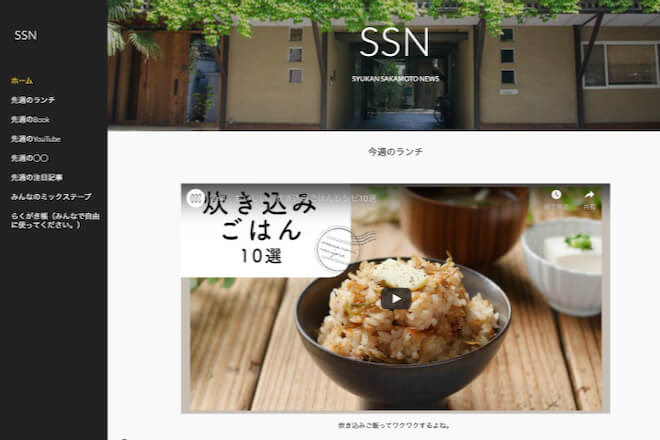
"Even if we can't eat from the same pot, we can see the same things," said Sakamoto, who started Weekly Sakamoto News (SSN). The site distributes content that everyone in the company can enjoy.
I was also publishing "SSN (Weekly Sakamoto News)", but I couldn't make it into the team, and that's something I really regret this year. If I play serious batting alone, I can't hit a home run. I've finally gotten over my bad peak, but I think that's what I struggled with the most this year.
The job of sales is to control the expected value of deliverables against the budget
Sugimoto: When I heard about your sales style before, I thought it was very creative. For example, you check the clothes that will open up to customers through your own experience, and you come up with a strategy to make them say "Wow!" at the first meeting. You also have a strong sense of valuing the team. How do you view your sales job, Mr. Sakamoto?
Sakamoto: I like sales work. It's fun to show that I can do this much and get work at a reasonable level of expectation. The thing about clothing is about controlling expectations for yourself, but it's also about controlling expectations for the end product. If you sell it cheaply, you can get the job, but if you sell it too expensive, you're more likely to get complaints.
Also, when I was in sales at CF (Coding Factory), I thought that only sales could raise the unit price, reduce overtime, and increase productivity while everyone was working hard. I think the job of sales is to find the boundary that allows customers to place orders comfortably and allows everyone to work comfortably, and then to "set it here."
Sugimoto: I think communication about money can be a little difficult, both between companies and between individuals.
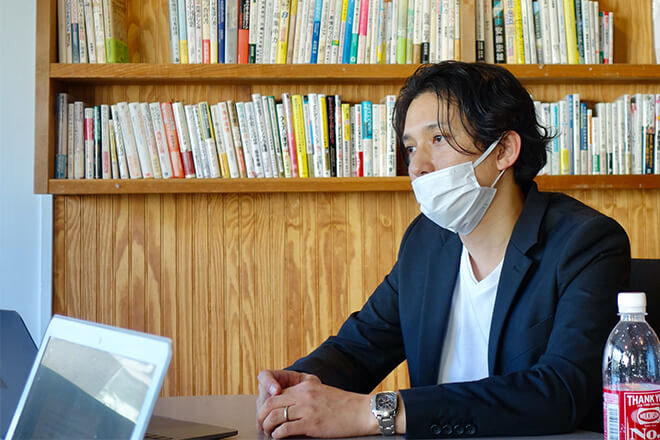
Sakamoto: I'm always thinking about how to ask customers about their budget without making them feel uncomfortable. But, for example, it's always better to ask about the budget for a competition, for the sake of both parties. In the past, I was told, "The budget is up to you. We want you to propose something good," but I was rejected because I was evaluated as "I wanted a Corolla, but they proposed a Lexus." If you don't know the budget, the quality of the proposal will be unstable.
Sugimoto: I see. So your job is to create interesting work by matching what the customer wants with what Monosus can provide. What other ideas do you have?
Sakamoto: I think it's important to think about what's beneficial for the person in charge. When a director from a production company who is a CF client asked me, "What kind of configuration should we use for this CMS (Contents Management System)?", I sometimes provided a CMS specification document, even though I'm in sales. This way, I can be sure to receive orders from that person.
Also, if you decide to go with a big company and it fails, you'll think, "It can't be helped," but if you place an order with a small company like Monosus and it fails, the person in charge will be told, "It's because you chose that unknown company." The goal of the job is to get results on the web, but when the person who placed the order ends up being promoted, I think it's very rewarding.
At the root of this is the feeling that work can become more interesting if you change the way you think.
Sugimoto: Apart from the company's goals, you have your own personal goals. When I talk to you, I don't get the feeling that you're being forced to do something. I get the feeling that you're going to decide for yourself what your work will be.
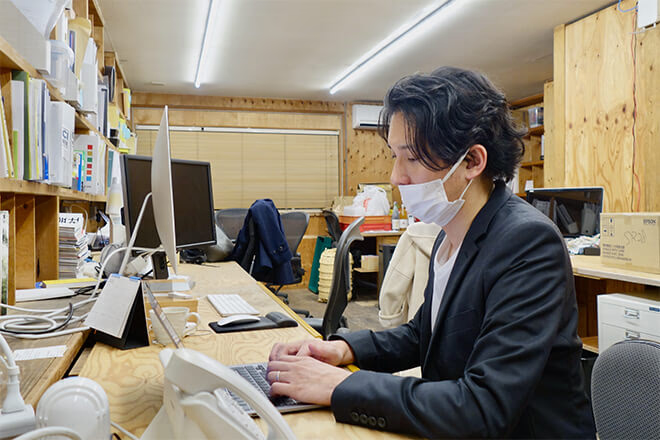
Sakamoto: Hmm. For one thing, I think that work that you're forced to do is boring and not fun. A long time ago, when I was working at the company of Mr. Nagai, who is now the vice president of Monosus, there were a lot of strange people around me. One of them was the president, Mr. Hayashi, who would suddenly call me in the middle of the night and say, "Can you finish this by tomorrow?" Like, "Can you do it?" (laughs). I was trained by people who would say, "You don't have to try so hard, just finish it," and I also learned that the idea of slacking off is very important.
For example, even if you are asked to "finish it tomorrow," the answer may be, "It's fine if it's only temporary, but it's important that the product is ready tomorrow." There is always a way to hit the secret points that meet the person's needs. It's easy to say "I can't do it," but depending on the idea, there are tricks. It's fun when things go well and results are produced. Maybe the feeling that "work can be interesting if you change your way of thinking" is at the root of it. If we're going to work, I want everyone to have fun.
Sugimoto: I think that because I enjoy working in such a team, I started distributing "Weekly Sakamoto News (SSN)" to create internal communication when we went fully remote. What do you like about Monosus, Mr. Sakamoto, and why did you choose to work here?
Sakamoto: I wonder why. I guess it's because they allow a lot of different things. To put it in a positive way, it's freedom, but to put it in a negative way, there are no instructions. It might be painful for people who like to wait for instructions. But I guess that's what suits me.
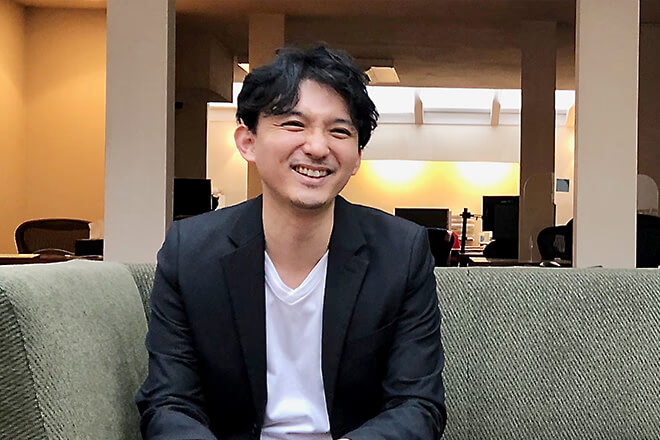
"I don't talk about this with anyone," said Sakamoto-san as he talked to us about Monosus and his sales job. I think it's great that he enjoys his work, not just by achieving immediate results, but also by thinking about his coworkers and the customers who place orders with him. Once again, I'm grateful that he put it into words!
Next up we will be speaking with Izumi Kojima from the Coding Factory. Please look forward to it!
